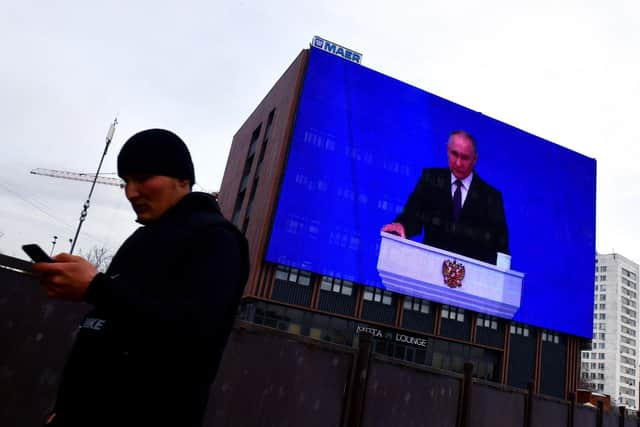Russia's war on Ukraine: Vladimir Putin's nuclear threats cannot be allowed in influence West's policy – Scotsman comment
As mourners prepare for today’s funeral of Russian opposition leader Alexei Navalny – one among tens of thousands of people who have lost their lives because of Vladimir Putin – politicians in the West will be contemplating the murderous dictator’s latest threat to use nuclear weapons.
Apparently incensed by French President Emmanuel Macron’s remark that sending Nato troops to Ukraine “could not be excluded”, Putin warned “interventionists” that Russia has “weapons that can hit targets on their territory”, adding: “All this really threatens a conflict with the use of nuclear weapons and the destruction of civilisation. Don't they get that?”
Advertisement
Hide AdAdvertisement
Hide AdIn his mind, he is a strongman putting weak democratic leaders in their place. But, in reality, the issuing of wild threats to destroy civilisation is a sign of his weakness. If his conventional forces were stronger, there would be no need to raise the spectre of Armageddon.
‘Mutually assured destruction’
While it would probably be unwise for Nato troops to join the war in Ukraine, the democratic world must not be influenced by Putin’s threats to use nukes, which he tends to make seemingly without recognising that Nato has them too. But then, perhaps he is thinking about a world in which Donald Trump takes the US out of the alliance, which would leave only the UK and France to provide the ultimate deterrent.
Putin must not be allowed to think that he can make military gains under the cover of nuclear threats. If he does, then an invasion of the Nato-member Baltic states and the risk of a nuclear confrontation would become more likely. As utterly terrifying as it is, the bleak logic of deterrent must be maintained: if Putin uses nuclear weapons, Nato will respond in kind.


The threat of “mutually assured destruction” (MAD) helped keep the peace during the Cold War. Assuming Putin has not entirely lost his mind, it should do so again. If he has, we may have to hope a modern-day Stanislav Petrov, a Lieutenant Colonel credited with saving the world in 1983 after a Soviet early-warning system wrongly indicated a US nuclear attack, will come to the rescue.
Comments
Want to join the conversation? Please or to comment on this article.
